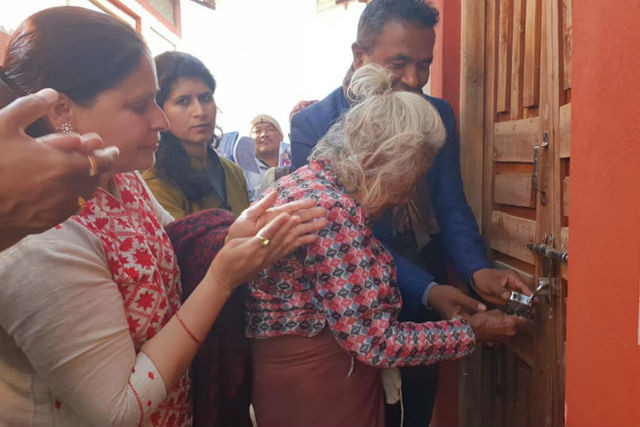Jess Bauldry: Can you tell us about a few of the projects AEIN is working on presently?
Françoise Binsfeld: AEIN is currently supporting 10 development projects in India and 10 in Nepal, with an annual budget of more than €1.3m. Our projects are mostly integrated projects which are impacting several aspects of people’s lives, namely education and training, health, agriculture and ecology, and their rights.
We support grassroots NGOs working in rural areas on the issues concerning women, children/youth, tribals, dalits [lowest Indian caste], and farmers. The support is mainly for mobilising and organising marginalised communities and empowering them to assert their rights through awareness creation, skill building, livelihood support, policy advocacy and lobbying and networking at various levels
In India, we are supporting a campaign against child marriage in the state of Karnataka, projects focusing on integrated rural development targeting tribal communities in Orissa, Jharkhand, Chhattisgarh and Gujarat, and agricultural projects in Maharashtra, Andhra Pradesh and Telangana.
This month, we launched two new projects in Nepal. One is promoting the rights of women, children and youth in the remote areas of Dailekh and Kalikot districts, and the other is providing clean drinking water to 2,510 villagers in Surkhet district.
From October 2018 to September 2019, we are also financing a rehabilitation project for flood survivors in the districts of Idduki and Ernakulam in Kerala, India, with a total budget of €100,000. The project consists amongst others of rebuilding 50 houses, restoring the livelihood of 111 families and rehabilitating 25 drinking water sources.
Finally, we will launch next month two new climate change projects in India and Nepal with the financial support of the Luxembourg Ministry of Sustainable Development and Infrastructure through the Luxembourg international climate fund. The objective of the projects is to enhance awareness-raising and capacity building among community people, farmers and local governments to take up climate change adaptation and mitigation measures, by moving towards “climate-smart villages” in the project areas.

Françoise Binsfeld meeting with a Nepali woman after the 2015 earthquake. Photo: AEIN
JB: AEIN's work in Nepal became even more essential after the devastating 2015 Nepal earthquake, which killed around 9,000 people. How much progress is being made in the country to repair the damage of this earthquake?
FB: The reconstruction and rehabilitation process in Nepal is still not completed three years after the earthquakes. The National Reconstruction Authority of Nepal published at the end of December 2018 the progress made in the post-earthquake reconstruction and rehabilitation. As of now, only 45% of the damaged private houses have been reconstructed, while more than 230,000 houses are currently under construction. Out of the 7,553 damaged schools, only 4,172 have been reconstructed. A certain number of health posts, historical buildings and other infrastructures still need to be repaired in the affected areas.
AEIN, with the financial support of the Ministry of Development Cooperation, reconstructed, from January 2016 to December 2017, four high schools and one early childhood centre for 1,600 students, equipped five schools with educational material, benches and desks for pupils, and supported 230 poor children in paying their school fees. We further constructed three water tanks and seven water supply systems for 1,260 families, nine toilets in three schools and provided access to drinking water for 1,350 pupils.
The most challenging work was however the reconstruction of one entire village composed of 56 private houses in the district of Sindhupalchowk, which we finished end of last year. AEIN, together with its local partner Women’s Rehabilitation Centre (WOREC), are one of the first NGOs in the district who successfully completed their project. Thus, it was a very proud moment for us when we could finally hand over the houses to the 272 villagers in an official ceremony on Christmas Eve.

Interaction with beneficiaries from an agricultural project in Andhra Pradesh. Photo: AEIN
JB: How do funds raised from the annual bazaar support your projects and what other sources of funding do you get?
FB: Our Indian and Nepalese Bazaar is our main fundraising event each year. This year’s proceeds will be used to finance several agriculture projects in India and Nepal.
For AEIN partner organisations active in the fields of agriculture and ecology, food security and improving the economic situation of families is the primary goal. In concrete terms, their initiatives consist of: sustainable management of land, water and forests; conservation of genetic diversity of crops; creation of agricultural cooperatives; more efficient marketing of agricultural products; implementation of measures to mitigate and adapt to climate change.
As a recognised non-government organisation, we are very fortunate to get the financial support of the Luxembourg Ministry of Development Cooperation, which is co-financing our development projects and our awareness-raising activities up to 80%. In order to cover the remaining 20%, we depend on donations from individuals, associations, municipalities and private companies. We cannot continue supporting our action in India and in Nepal without adequate financial means. We wholeheartedly accept each and all donations, which are tax deductible under Luxembourg’s applicable law.
